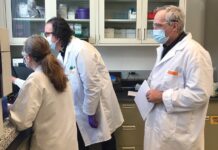A Providence-based biotechnology pharmaceutical firm that genetically engineers new vaccines has received a $528,313 grant to begin developing a novel treatment for hemophilia.
EpiVax Inc. will use the grant, from the National Institutes of Health, to reengineer Factor VIII, a clotting agent in the blood that is deficient in hemophiliacs. Lab-engineered Factor VIII has long been used to treat people with the disease, but many hemophiliacs develop an immune response to the treatment.
EpiVax hopes to genetically modify Factor VIII so that it is not rejected by the bodies of hemophiliacs, said Daniel S. Rivera, the company’s director of molecular and cellular biology.
“We’ve identified the regions responsible for the immune response, and now re-engineering the protein so you can give it to patients over and over again without any immunoreactive response,” he said.
Researchers will conduct studies in special strains of mice to see whether the reengineered FVIII protein avoids the usual antibody responses. The program will be carried out by EpiVax in collaboration with Dr. David Scott at the University of Maryland and Dr. Ed Forman at the Hasbro Children’s Hospital, who Epivax said is Rhode Island’s leading expert in the treatment of hemophilia.
Following the two-year program, EpiVax hopes it will have developed a new drug for hemophilia that it can start testing in large animals and then scale up for a clinical trial, Rivera said.
“This is an entirely novel approach to improving Factor VIII therapy,” Dr. Anne De Groot, president and CEO of EpiVax, said in a press release. “We hope to make it possible for persons living with hemophilia to avoid a common side effect of FVIII that is currently in use – the development of ‘inhibitors’ to the life-saving therapy.”
More than 18,000 people in the United States have hemophilia, a potentially life-threatening bleeding disorder, according to the Centers for Disease Control and Prevention.
The money is the latest in more than $3 million in grants that EpiVax has gotten from the small business funding arm of the NIH since the company was founded in 1998 by De Groot, who is also an associate professor of community health and medicine at Brown University and director of Brown Medical School’s TB/HIV Research Laboratory.
EpiVax’s work to find a new treatment for hemophilia is one of several ongoing projects. EpiVax is also working to develop vaccines for HIV, smallpox, tularemia, and other infectious diseases and potential bioterrorist weapons.
At the core of all EpiVax’s work is the EpiMatrix System, a vaccine design technology that uses algorithms and coefficient sets to predict which parts of a gene sequence will activate T-cells, which direct all other cells in the immune system.
Rivera credited the state’s quasi-public Slater Technology Fund with providing seed funding that enabled EpiVax to develop the technology platform that he said is now driving the company’s success.
“They’ve been really instrumental throughout our entire growth process,” he said.











